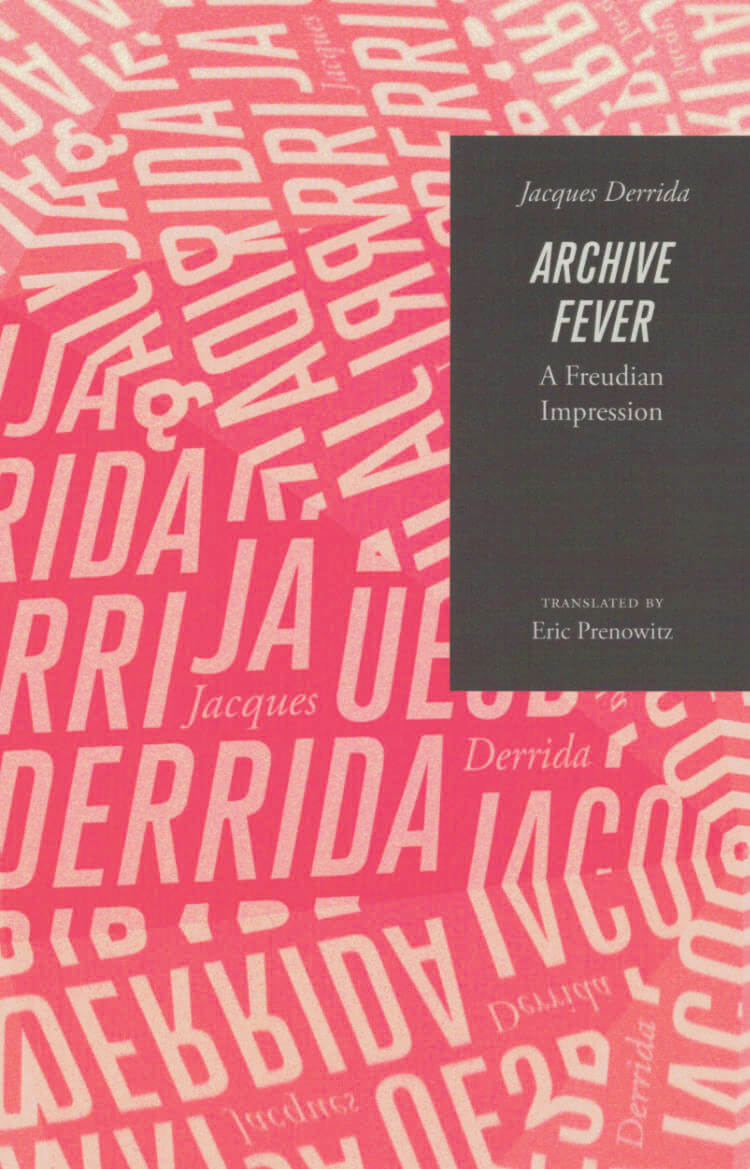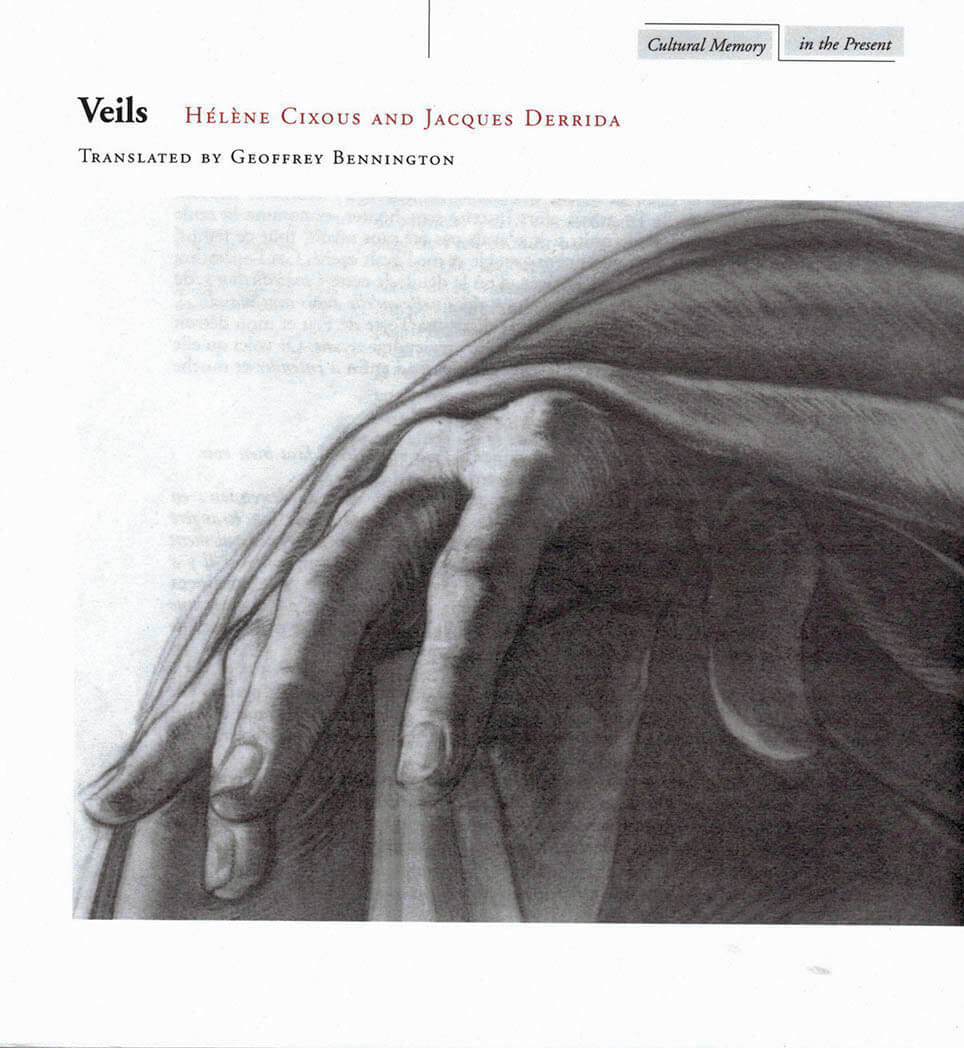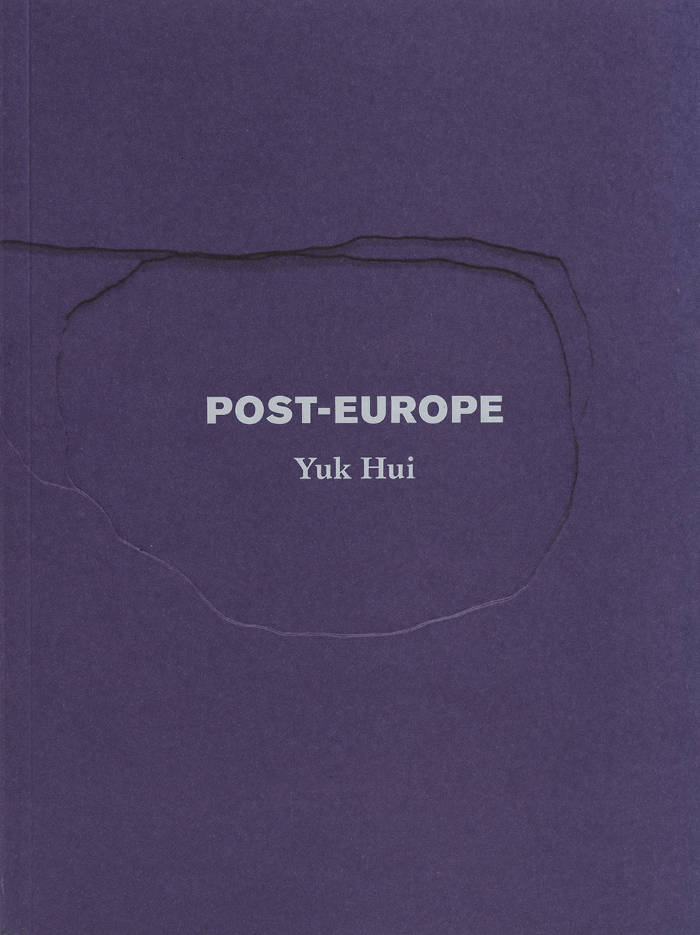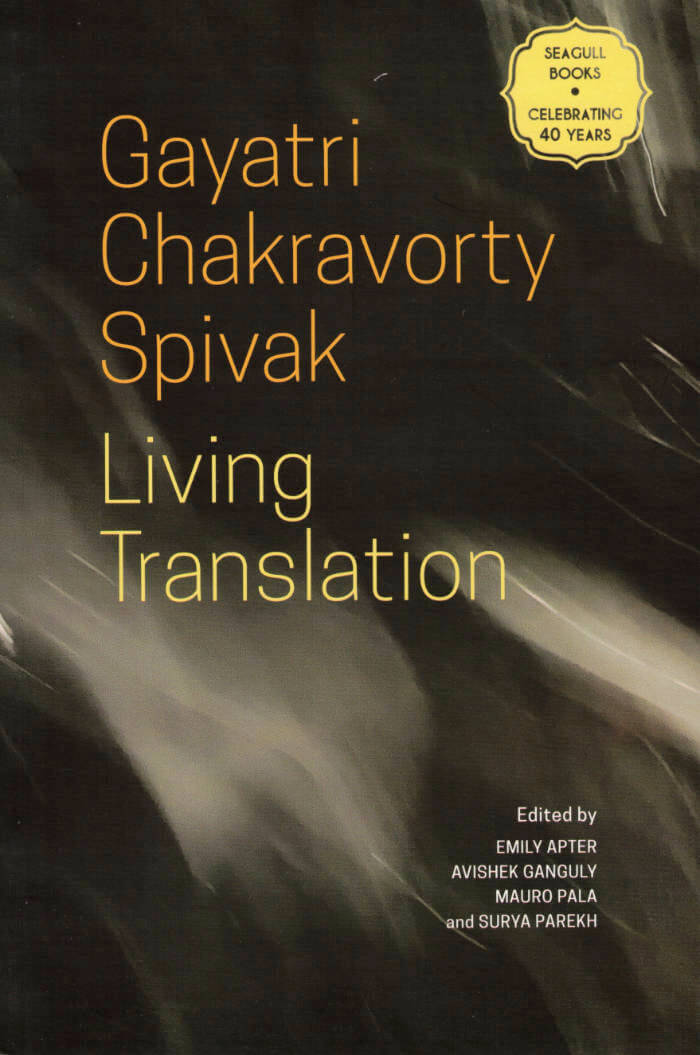Jacques Derrida
Jacques Derrida

Archive Fever
In Archive Fever, Jacques Derrida deftly guides us through an extended meditation on remembrance, religion, time, and technology, fruitfully occasioned by a deconstructive analysis of the notion of archiving. Intrigued by the evocative relationship between technologies of inscription and psychic processes, Derrida offers for the first time a major statement on the pervasive impact of electronic media, particularly e-mail, which threaten to transform the entire public and private space of humanity. Plying this rich material with characteristic virtuosity, Derrida constructs a synergistic reading of archives and archiving, both provocative and compelling.

Without Alibi
This book brings together five essays by Jacques Derrida, which advance his reflections on many issues: lying, perjury, forgiveness, confession, the profession of faith, and, most recently, cruelty, sovereignty, and capital punishment.
Strongly linked by their attention to "performatives" and the "as if," the essays show the necessity of thinking beyond the category of acts that are possible for a subject. Derrida argues forcefully that thought must engage with the im-possible, that is, the order of the unforeseeable event, the absolute future still to come. This acute awareness of the limits of performative programs informs the essays throughout and attunes them closely to events of a world undergoing "globalization."
The first essay, "History of the Lie," reviews some classic and modern definitions of the lie (Augustine, Rousseau, Kant, Koyré, Arendt), while renewing questions about what is called lying, as distinguished from other forms of nontruth. This inventive analysis is followed by "Typewriter Ribbon," which examines at length the famous lie recounted by Rousseau in his Confessions, when he perjured himself by accusing another of his own crime.
Paul de Man's reading of this textual event is at the center of Derrida's patient, at times seriously funny analyses. " Le parjure, Perhaps" engages with a remarkable novel by Henri Thomas that fictionalizes the charge of perjury brought against Paul de Man in the 1950s. Derrida's extraordinary fineness as a reader and thinker of fiction here treats, to profound effect, the "fatal experience of perjury."
The two final essays, "The University Without Condition" and "Psychoanalysis Searches the States of Its Soul," address the institutions of the university and of psychoanalysis as sites from which to resist and deconstruct the nontruth or phantasm of sovereignty. For the university, the principle of truth remains at the core of its resistance; for psychoanalysis, there is the obligation to remain true to what may be, Derrida suggests, its specific insight: into psychic cruelty. Resistance to the sovereign cruelty of the death penalty is just one of the stakes indicated by the last essay, which is the text of a keynote address to the "States General of Psychoanalysis" held in Paris, July 2000.
Especially for this volume, Derrida has written "Provocation: Forewords," which reflects on the title Without Alibi while taking up questions about relations between deconstruction and America. This essay-foreword also responds to the event of this book, which Peggy Kamuf in her introduction presents as event of resistance.
Without Alibi joins two other books by Derrida that Kamuf has translated for Stanford University Press: Points . . .: Interviews, 1974-1994 (1994) and Resistances of Psychoanalysis (1998).

Veils
Hélène Cixous, Jacques Derrida
This book combines loosely "autobiographical" texts by two of the most influential French intellectuals of our time. "Savoir," by Hélène Cixous is an account of her experience of recovered sight after a lifetime of severe myopia; Jacques Derrida's "A Silkworm of One's Own" muses on a host of motifs, including his varied responses to "Savoir."
Hélène Cixous is Professor of Literature and Director of the Centre d'Etudes Feminines, Paris VIII. Jacques Derrida is Director of Studies at the Ecole des Hautes Etudes en Sciences Sociales, Paris, and Professor of Humanities at the University of California, Irvine. Stanford has published nine of his books, most recently Of Hospitality, which also includes a text by Anne Dufourmantelle (Stanford, 20
And more

Stop Thief!: Anarchism and Philosophy
Many contemporary philosophers – including Michel Foucault, Jacques Derrida, and Giorgio Agamben – ascribe an ethical or political value to anarchy, but none ever called themselves an “anarchist.” It is as if anarchism were unmentionable and had to be concealed, even though its critique of domination and of government is poached by the philosophers.
Stop Thief! calls out the plundering of anarchism by philosophy. It’s a call that is all the more resonant today as the planetary demand for an alternative political realm raises a deafening cry. It also alerts us to a new philosophical awakening. Catherine Malabou proposes to answer the cry by re-elaborating a concept of anarchy articulated around a notion of the “non-governable” far beyond an inciting of disobedience or common critiques of capitalism. Anarchism is the only way out, the only pathway that allows us to question the legitimacy of political domination and thereby wfree up the confidence that we need if we are to survive.

Post-Europe
Today, we increasingly live in a state of becoming-homeless, while our homelessness also produces a desire for some form of homecoming, as is evident in the rise of conservative and neoreactionary movements worldwide.
With the unstoppable advance of global capitalism, the Heimatlosigkeit (homelessness) which twentieth-century European philosophers spoke of, and which Heidegger declared had become the ‘destiny of the world’, is set to become ever more pathological in its consequences. But rather than dreaming of an impossible return to Heimat, Yuk Hui argues that today thinking must start out from the standpoint of becoming-homeless—which also implies thinking a Post-Europe condition.
Europe may now be only one region among others, but to imagine that its decline simply marks a shifting of the locus of ‘world history’ to the East is to remain within the sphere of European techno-logocentrism. The planetary spread of technology may have released modern science and technology from being exclusively European assets, but it has also propagated a set of cognitive models that bar us from thinking otherwise, and put in place a global axis of time through which European modernity becomes the synchronising metric of all civilisations.
Following Novalis’s suggestion that philosophy is a form of homesickness, Jacques Derrida’s claim that philosophy is intrinsically European, and Bernard Stiegler’s insistence that philosophy’s logos is inextricable from the techne of technology, in Post-Europe Yuk Hui envisions a project of a post-European thinking. If Asia and Europe are to devise new modes of confronting capitalism, technology, and planetarisation, this must take place neither through a neutralisation of differences nor a return to tradition, but through a new individuation of thinking between East and West.
Drawing on the philosophies of Gilbert Simondon, Jacques Derrida, Bernard Stiegler, and Jan Patočka alongside the thought of Kitaro Nishida, Keiji Nishitani, Yoshimi Takeuchi, and Mou Zongsan among others, this examination of the relation between philosophy, technology, and the decline of European hegemony is also a reflection on the author’s own trajectory as a wanderer and an immigrant, and the complicit relation established between corporeal memory, linguistic plasticity, and Heimat via the tongue, that most neglected of technical organs.
Yuk Hui is the author of several titles including On the Existence of Digital Objects (University of Minnesota Press, 2016), The Question Concerning Technology in China: An Essay in Cosmotechnics (Urbanomic, 2016), Recursivity and Contingency (Rowman & Littlefield, 2019), Art and Cosmotechnics (e-flux/University of Minnesota Press, 2021), and Machine and Sovereignty: For a Planetary Thinking (University of Minnesota Press, 2024). He is currently Professor of Philosophy at Erasmus University Rotterdam.

Living with Ghosts: A Reader
Living With Ghosts explores the ways the unresolved traumas of Africa’s colonial past, and its unfulfilled project of decolonisation, continue to haunt the present global order. The reader further expands on these complex ideas through philosophical, historical, and literary approaches. Reprinted texts by thinkers such as Achille Mbembe, C.L.R. James, and Sabelo J. Ndlovu-Gatsheni explore the historical experiences of the African postcolony and the problematics of decolonisation. Meditations on artists including John Akomfrah and Abraham Oghobase provide engaging entry points to their multi-layered artistic practices. Also featured are images of artworks in the exhibition and an in-depth conversation between Bouchra Khalili and KJ Abudu.
Texts by Achille Mbembe, Jacques Derrida, C.L.R. James, Sabelo J. Ndlovu-Gatsheni, KJ Abudu, Emmanuel Iduma, Walter D. Mignolo, Avery F. Gordon, Adjoa Armah, Joshua Segun-Lean. Conversation with Bouchra Khalili and KJ Abudu.

Living Translation
Living Translation offers a powerful perspective on the work of distinguished thinker and writer Gayatri Chakravorty Spivak, revealing how, throughout her long career, she has made translation a central concern of the comparative humanities.
Starting with her landmark "Translator's Preface" to Jacques Derrida's Of Grammatology in 1976, and continuing with her foreword to Mahasweta Devi's Draupadi and afterword to Devi's Chotti Munda and His Arrow, Spivak has tackled questions of translatability. She has been interested in interrogating the act of translation from the ground up and at the political limit. She sees at play at border checkpoints, at sites of colonial pedagogy, in acts of resistance to monolingual regimes of national language, at the borders of minor literature and schizo-analysis, in the deficits of cultural debt and linguistic expropriation, and, more generally, at theory's edge, which is to say, where practical criticism yields to theorizing in untranslatables.
This volume also addresses how Spivak's institution-building as director of comparative literature at the University of Iowa—and in her subsequent places of employment—began at the same time. From this perspective, Spivak takes her place within a distinguished line-up of translator-theorists who have been particularly attuned to the processes of cognizing in languages, all of them alive to the coproductivity of thinking, translating, writing.

Disappearing Curtains
This book sees the re-emergence of the seminal 1970s magazine Curtainsedited by British artist/writer, Paul Buck.
With its early promotion of French writers such as Georges Bataille, Maurice Blanchot, Jacques Derrida, Jean-Pierre Faye and Edmond Jabès, Curtains’ re-appearance arrives after an exhibition at Focal Point Gallery in 2012 that was recreated from an earlier 1992 work at Cabinet Gallery around the concept of ‘disappearing’.
The invited contributions come from thirteen artists with whom the editor has engaged over the years. In addition, Buck has returned to pull threads from the earlier editions of his magazine to explore ideas with writers encountered in the intervening years, making all appear in a consolidated grouping as a final gesture, one that refuses to disappear.
Contributions include those by: Kathy Acker, Susan Hiller, Liane Lang, Lucy McKenzie, Richard Prince, Miroslav Tichy, Sophie von Hellermann, and many others.